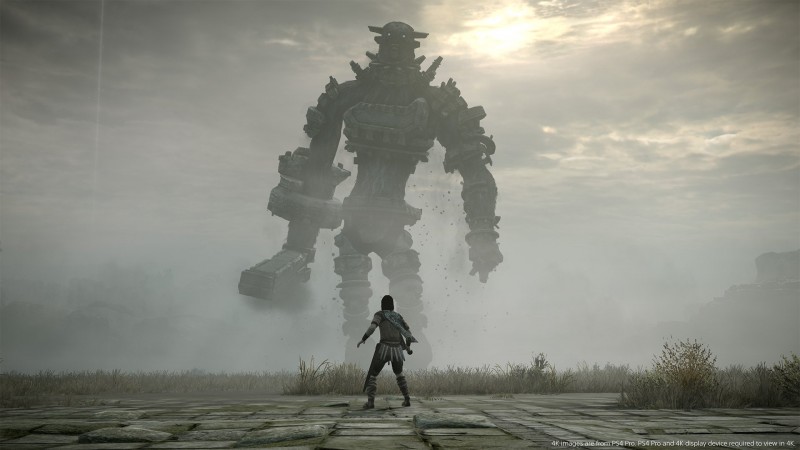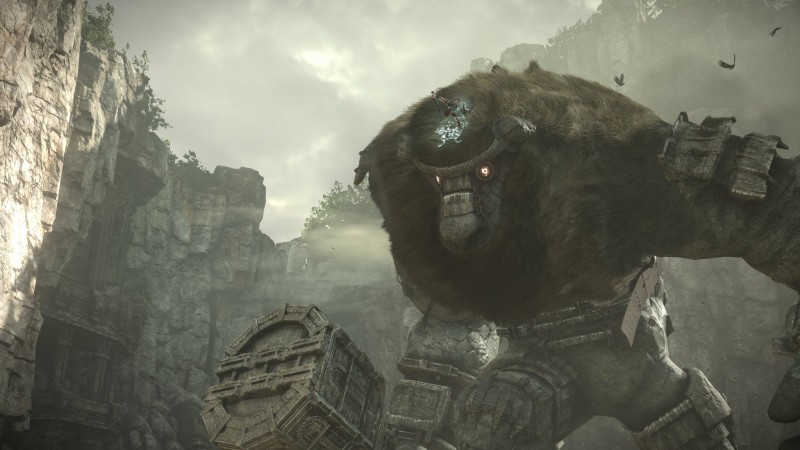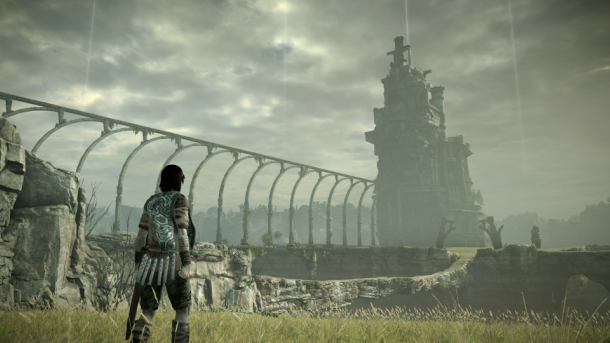The Virtual Life – Shadow Of The Colossus And The Joys Of Lonesome Roads

I was 17 when I started driving every other weekend from Charlotte to Atlanta. The purpose of those trips was to see a person I loved, but that’s neither here nor there. That’s not the story. The road is the story – nearly 250 miles of cracked asphalt cutting through dying towns and state lines.
My friends often expressed sympathy for me. “Oh, that trip sounds like it sucks,” they’d say. Or they’d apologize for having a party I couldn’t make because of these scheduled trips. My usual reply was probably something along the lines of, "Yeah, it's not the best," said in the key of it-is-what-it-is.
But the truth is maybe I didn’t mind it. Maybe, for an hour every other Thursday night, I’d pack a small bag of clothes and toiletries, agonizing over which novels I wanted to stuff in it. Maybe I spent hours prepping genre playlists for the three and a half hour trip, songs that would blare and thump me awake during the initial hours. Maybe I rose all those Fridays before the sun, poured some cheap but effective coffee into a cup, and hit the road in a hand-me-down Corolla with a grin on my face, knowing that the next four hours belonged to me alone.
The capital-T truth is that I loved it. I've spent a fair amount of time over the past few days thinking about that routine journey thanks to the remaster of Shadow of the Colossus.

Shadow of the Colossus is a classic PlayStation 2 game about a wanderer seeking out 16 giant stone monsters lumbering around a huge sprawl of land and slaying them one by one.
Wait. Scratch that. That’s a Wikipedia entry. We can do better.
Shadow of the Colossus is about going to desperate lengths for the person you love, putting everything on the line, and paying a high cost for something beyond yourself.
No, no no no no. That’s not right either.
Shadow of Colossus is a bold, interactive parable about the selfish motivations that exist beneath supposedly noble endeavors. The tainted and destructive underbelly of chivalry. A demonstration of what happens when we let romantic notions override our sense of duty and utilitarian good.
Nope. Not it either. Actually, all of these are valid interpretations. That’s part of Shadow of the Colossus’ enduring legacy: the cruelty of Wanderer’s actions, the somber music and sympathetic cinematography that houses each colossi’s death, and the bleak ending make this game a complex work to dissect.
For me though, when I think about Shadow of the Colossus, I don’t think about those particular qualities. Don’t get me wrong, the story progression is compelling and the majority of Colossi fights are breathtaking in their scale and fun to figure out (the eighth Colossus can be catapulted into the sun though). Precious few games marry traditional storytelling with interactivity this well, letting us experience fantastical fights from the likes of Greek epic poems while also putting a subversive twist on heroics. Years later, Shadow of the Colossus is still infuriatingly clever as an interactive story.
But I think of its spaces the most: the small, mundane adventures that occur between the fights with the epic colossi, on the wide plains and within the rocky corridor-like canyons. Trotting through all of these sacred yet unassuming places I can't help but think of the road.

For four hours, during every other weekend for three years, with nothing left to do but listen to music and stare out at an endless stretch of road, I’d pursue myself. The self that I wanted to be, that I thought I wanted to be.
I held court in my own delusions. I dreamed of being famous, of being validated by external sources. I wanted to be a seminal novelist, a visionary director, a brilliant satirist armed with a keen eye and arsenal of zingers. I traced out all the possible futures I could have and pondered them. I wrote entire (bad) novels in my head while driving in the early hours of the morning. For three years, I made these trips and contended with and educated myself about myself. I hatched plots. I dreamed of epic fiction you’ll never read (be thankful). I bobbed my head to Wu-Tang and St. Vincent. But most of all, I drove, my eyes scanning a starry skyline or cows chewing on grass on the sides of the interstate. Sometimes I’d switch the music off and just listen to the sounds encasing me.
The constant groan and whirl of an engine I never took care of as much I should have. The occasional siren of a police cruiser dashing past me to chase down some speedster. Tires kicking up gravel.

Gravel and dirt go flying as the horse Agro gallops across the bridge, rocks tumbling down into the ravine far below. The game’s camera pulls out to show how big the land is. Truth be told: the size of Shadow of the Colossus’ world isn’t that big. The map certainly doesn’t come close to matching Los Santos or Breath of the Wild’s version of Hyrule in acres.
However, Shadow of the Colosus weaponizes the size of The Forbidden Land against the player, with the camera constantly swinging around Wanderer and Agro to show you the depth of ravines, the multi-skyscraper height of peaks and mountains, and crumbling castles. The game actively attempts to make you feel like a trespassing ant in a world you don’t understand. There are also no side quests to speak of. Before the arrival of overstuffed open-world games, Shadow Of The Colossus opted for a minimalist game tucked inside an open-world wrapper. You can eat lizards to build up your stamina for colossus fights, but there are no villagers to save, no chores to perform.
Just you, the colossi, and the open road.
And good grief, what a road it is. Winding paths cutting through green mountains and deserts stretching as far as the eye can see. Every location in Shadow of the Colossus, despite its emptiness, feels like a real, lived-in place. Those mountains I mentioned earlier? There’s a crumbling temple entombed in them, showing signs of some kind of mysterious civilization that has long since vanished.
On paper, this isn’t exciting. So many open-world games have this environmental-storytelling-graveyard thing in effect, with you coming across a house filled with skeletons posed in an interesting fashion, surrounded by journals designed to give you an idea of what sort of violence happened here. However, Shadow of the Colossus chooses ambiguity and mystery over sating the player’s desire to know what happened here.
So many times during my latest playthrough, I chose to explore and get lost on the way to fights with the colossi. There was no material gain for this, no new piece of traditional gameplay content to explore from doing this. Just me, Agro, and the wind blowing as we explored a valley, the echo of hooves on the rocks throughout. I deliberately scaled hills to look out across green plains and ruined structures rather than immediately rush toward the colossi. For nothing more than the pleasure of looking and wondering what happened here.
No notifications bombarded me about the wear and tear of my equipment or how much EXP I gained from finding a new place or slivers of clues about some NPC who may be hiding somewhere out of sight, waiting to give me an ancient weapon that grants me a stats boost in battle.
To hell with all of that.
Shadow of the Colossus chooses the road over all of it. It chooses the experience. In that way, it is a pure game, untouchable by the crutches of cluttered open-world design, of signposts telling you This Is How You Should Feel About This Thing You Just Did. The "journey alone is more than enough" is the gambit that Shadow of the Colossus makes, the very foundation it rests on.
If only other games were as brave.

I haven’t thought about the road in a long time. It was one of those things I tried to push to the side of my mind when I started another chapter in my life in Minneapolis. I don’t drive anymore. Don’t need to. Instead, I walk to work most mornings. A 40-minute commute with music pumping through my headphones, thoughts still centered on what the future may hold, but also on the present. On how I can do the best things for myself and the people I love – even strangers too. It’s never been something I’m great at, but I’m hoping to map that particular path and travel down it in the years to come.
I do miss it all, though. Moving through the night like a shark's fin cutting through water. Having conversations with myself. Seeing beautiful vistas emerge as I take turns, watching the sunlight strike the clearing ahead of the forest I'm surrounded by. I even miss the terrible gas station coffee, bitter and with bits of grind floating at the top. Maybe I'll take a trip soon. They have beautiful mountains here, I think. Cabins too.
Oh. Right. Video games. You're here for that. Well, if you've indulged me this much, perhaps I can leave you with this:
Games have always been art to me. Not just because they can make compelling commentary on politics and existentialism, but also because they’re pathways into the self. They’re just as capable of carrying us down new and nostalgia-less avenues of self-critique and self-understanding as any other art form. They can also spur us to action and help us roll with the changes thanks to yearnings and reminders, of who we were and who want to be, they leave with us.
With its constant sense of mystery and breathtaking design, Shadow of the Colossus stands tall not just as one of the boldest games ever made, but as an essential and moving piece of art that I think should be experienced by people who are wary of even touching a controller. Chances are you'll likely come away from it with a much different experience than I did. But I hope you do play it. And that you do like it. And that whatever you come away from it with, I hope it's positive. Whether it's a lasting memory you carry with you for the rest of your life or simply a couple of pleasant afternoons in front of a television that end with you going, "Well, that was nice."









